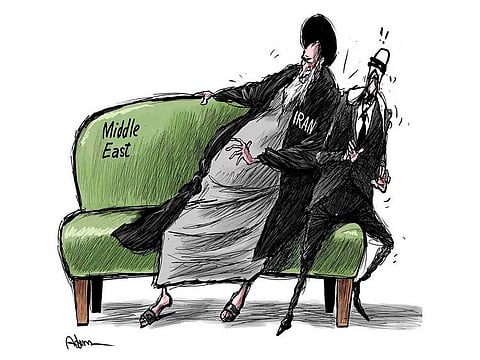Iran needs to change its behaviour
Tehran’s interference is obvious in the region with its continued funding militias

Iran has been under the control of the Ayatollahs’ since 1979. The architect of the Iranian Revolution and the first leader of the Islamic republic established in 1979, Ayatollah Khomeini and his religious grouping literally dragged Iran back and began a series of sinister moves with their neighbours. Although the reign of the first Ayatollah lasted about ten years, his policies were cemented by the clerical rule of Ayatollah Ali Khamenei that followed.
Iran’s belligerence translated into unprovoked adventures in Iraq and then began moving around the rest of the region. From Syria to Lebanon, from Bahrain to Yemen, the Iranian sphere of influence was trying to gain an unwelcome foothold and was met with resistance, a resistance that left many hundreds of thousands dead or homeless.
Saudi Arabia has been at the forefront of resistance against the creeping Iranian menace for decades now, a resistance that has been propped with arms and aid to their allies facing Iran’s nefarious motives, along with resistance by their own troops and munition along the border with Yemen. The country had to put up with an increasing number of missiles and drones aimed by Iranian proxy fighters in the south against residents of the kingdom.
Recently, the Saudi foreign minister bluntly stated that “The region has been unstable for some time and the main source of that instability is Iran and Iran’s continuing activity; in the region and its continuing focus on exporting its revolution; on making sure that it continues to be able to manipulate governments in various countries.”
Relating Iranian interference as obvious in the region where Tehran continues to fund militias and “use violence to try and further their political agendas, including attacking diplomatic missions,” the foreign minister added that “we see Iran having a hand in terrorist plots throughout Europe and other places.”
These are serious charges against a country that has indeed veered off from being a good neighbour and turned into a worrisome nation. So much so that many countries in the West have had to slap economic sanctions against the country, sanctions that have literally cripple the country and yet have not managed to blunt the fervour of the religious mullahs.
The Saudi foreign minister however did not slam the door shut on a possible rapprochement with Iran, adding that the Kingdom supports dialogue between the US and Iran and other parties. Noting that The Trump administration was open to dialogue with Iran, and it was Iran that closed the door to that dialogue, the Saudi FM noted "we will be open to real dialogue in the future that addresses significant issues of concern including nuclear non-proliferation, use of ballistic missiles and most importantly Iran's destabilizing activities."
Iran today is in shambles and just managing to get by with many of the daily essential services in short supply or not available. This was very evident during the initial outbreak of Covid-19 earlier in the year which swept through Iran leaving thousands of dead. The Iranian health authorities simply did not have the equipment and facilities to cater to such a pandemic.
Instead, the ruling religious authorities were more concerned with developing their nuclear arsenal at the expense of their people. At what price does such a tactic yield result, leaving their own people hungry and almost destitute?
Religious fever and politics simply do not mesh well anywhere in the world, and Iranians should better begin to realise that all those fiery speeches from their clerics have resulted in nothing over the years. It is one thing indulging in rhetoric but what is the outcome: An absolute zero. When it comes to their standard of living or standing in the global comity of nations, Iranians lag behind. The fortunate ones were able to escape the country when they had a chance and eked out a decent living elsewhere.
But for the millions still trapped under the religious dogma, it is perhaps time to question this system that has continued for so long. Only then can Iran expect to be accepted as a regional partner and not a regional and international pariah.
— Tariq A. Al Maeena is a Saudi sociopolitical commentator. He lives in Jeddah, Saudi Arabia. Twitter: @talmaeena



